Top Features of Litigation Document Management Software
Top Features of Litigation Document Management Software
When your day is packed with deadlines, meetings, and case updates, the last thing you want is to waste time hunting for the right file. Managing legal documents shouldn’t slow you down—it should support your workflow and keep everything on track.
That’s why having a reliable system matters. Litigation document management software helps legal professionals organize files by case, manage version control, share documents securely, and keep everything accessible in one place.
This guide breaks down what these tools do, how they support everyday legal work, and which features are worth paying attention to.
Whether you’re with a large firm or managing cases on your own, having a better way to handle documents can save time, prevent mistakes, and keep your practice running more smoothly.

What Are Litigation Document Management Tools?
Litigation document management tools are software platforms built to help legal professionals organize, store, search, and share documents tied to lawsuits and other legal work.
Unlike general file storage apps, these tools are made for law firms, so they handle things like case-based organization, secure access, and version control right out of the box. They make it easy to keep discovery files, motions, transcripts, and exhibits all sorted by matter.
Most tools also include search filters, tagging, and audit trails, which help you find what you need quickly and stay compliant. Some even come with AI features for drafting and tools for collaboration. Essentially, they’re designed to support how litigation teams actually work, but without adding more steps.
What Can Litigation Document Management Tools Do?
Litigation document management tools aren’t just digital filing cabinets; they’re built to handle the back-and-forth of real legal work. From sorting thousands of documents to helping your team stay in sync, these tools cover more than basic storage.
Take a look at what they can actually do for your practice.
1. Organizing Case Files Across Multiple Matters
Managing documents for several cases at once takes more than a set of folders and file names. Without a clear system, it’s easy to mix things up or waste time searching for the right draft.
Legal document management software like NetDocuments helps keep everything in order. It’s a document management system built specifically for legal teams, with tools that let you organize files by matter, tag them by document type, and search by keywords or metadata.
It also adds structure to your legal document workflows. Each case stays separate, access can be limited by user or role, and audit trails track who viewed or changed a document. That’s especially useful when dealing with sensitive documents or working across teams.
Since NetDocuments is cloud-based, you’re not tied to your office computer. You can log in from anywhere with full access to your case files.
For teams managing multiple matters, it creates a single, reliable source of truth. That means no more back-and-forth trying to confirm which version is current or where something was last saved.
2. Drafting Legal Documents With AI
Drafting discovery requests and responses is tedious, repetitive, and time-consuming. Most of it follows a predictable format, but it still eats up valuable hours. That’s where Briefpoint, a legal document management software designed for litigators, makes a difference.
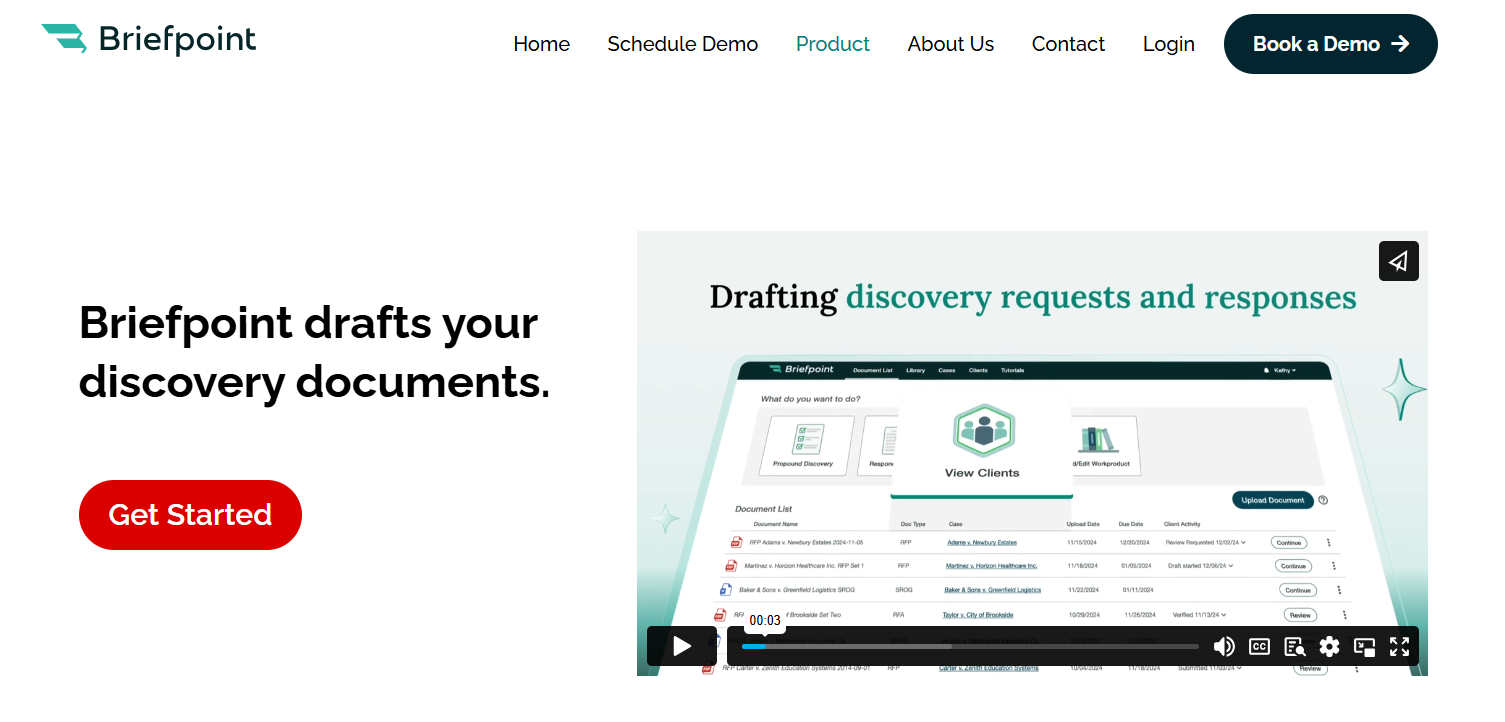
Briefpoint automates the drafting of Requests for Production, Requests for Admission, and Interrogatories—both for propounding and responding. It works across all U.S. states and federal districts, applying local formatting rules automatically.
Here’s how the process works:
- Propound: Upload a .pdf of your Complaint or Petition
- Respond: Upload opposing counsel’s requests/interrogatories
- Customize: Select objections, add responses
- Download: Get a Microsoft Word doc ready to review, sign, and serve
The AI extracts case details like court name, parties, request type, and more. From there, you can easily select objections, add responses, and download a clean draft, ready to finalize and send out.
Briefpoint doesn’t just save time; it helps teams stay consistent across cases and attorneys. You also don’t have to worry about security, as none of your data is used to train AI, and everything is encrypted.
If you’re still drafting discovery by hand, Briefpoint may be the smart shift you’ve been waiting for. Book a demo today.
3. Real-Time Collaboration on Case Documents
In the legal industry, collaboration isn’t optional—it’s constant. Partners, associates, paralegals, and clients often need to weigh in on the same documents.
Without a solid system in place, you’re stuck emailing drafts back and forth, losing track of who made what change, and crossing your fingers that the version you’re editing is the latest one.
A legal document management system built for collaboration can fix all of that. These systems let multiple people review, comment on, and update documents at the same time. Changes are tracked automatically, and version histories keep everything transparent.
In other words, you know exactly who did what and when.
Let’s say you’re finalizing a motion. One attorney updates the language, another reviews citations, and a third adds exhibits. With traditional tools, that’s three separate versions to manage. With the right system, it’s one file—everyone works in it together, and you stay in sync.
Real-time collaboration has become a basic expectation in legal document management solutions. When paired with your law practice management software, it cuts down on errors and keeps the whole team moving in the same direction.
4. Automating Document Version Control
Version mix-ups can derail even the most organized legal teams. When multiple people touch the same file, it’s easy to lose track of edits, or worse, send out the wrong draft. That’s why version control is one of the most valuable features in today’s document automation tools.
With the right system in place, every change is tracked. You can review previous versions, compare edits side-by-side, and restore older drafts if needed. This saves time, prevents mistakes, and avoids that awkward moment when someone realizes the wrong motion got filed.
Tools like NetDocuments and Worldox offer version control built into their platforms. But the real benefit is how these systems fit into your workflow. Only authorized personnel can make changes, while others can access documents in view-only mode. That keeps the process clean and prevents accidental edits.
Say you’re drafting a settlement agreement with multiple reviewers. Instead of juggling five versions with tracked changes in email, you’ve got one clean document, and every update is recorded automatically.
5. Secure Sharing With Co-Counsel or Experts
Legal teams often need to bring in outside help, such as co-counsel, expert witnesses, and consultants. Sharing files shouldn’t mean giving up control. With cloud-based legal document management software, you can grant access to the right people while keeping everything else locked down.
Rather than emailing attachments or uploading files to general cloud drives, legal-focused platforms offer features that protect your work and client data. You can choose exactly which files to share, decide who gets access, and track activity without extra steps.
Here’s what secure file sharing typically includes:
- Share specific documents only—no full-folder access
- Set view-only, no-download, or time-limited access
- Track views, downloads, and changes
- Remove access instantly if needed
- All files are encrypted and protected at rest and in transit
These tools function as both knowledge management software and seamless document sharing systems. For example, if an expert needs a batch of deposition exhibits, you can send just what they need with read-only access and get alerts when they open the files.
6. Ensuring Compliance With Court Orders and Retention Policies
Legal work also involves keeping a close eye on deadlines, document retention rules, and privacy obligations. Courts often require firms to retain or delete files on specific timelines.
Failing to do that can lead to unnecessary risks, especially when client confidentiality and regulatory compliance are involved.
Basic file storage platforms don’t cut it here. They might hold your files, but they rarely provide the tools to manage timelines, flag records for deletion, or track compliance actions. A proper system does more than store; it monitors, logs, and reminds.
With a good legal document management setup in place, your firm can track how long each file should be kept, restrict access based on staff roles, and automatically apply retention policies across the system. This helps prevent accidental deletions or holding on to sensitive files longer than allowed.
Data security is baked into the process. Files are encrypted, access is limited, and audit trails are recorded. When someone questions how your law firm’s documents were handled, you’ve got the logs to show it.
7. Tracking Review Progress and Reviewer Activity
When you’re dealing with hundreds (or thousands) of files, staying organized plays a big role in keeping the case on track. But without the right system, human error creeps in, and important documents can get overlooked.
Modern document management software makes it easier to keep everything moving. You can assign documents, track who’s working on them, and spot bottlenecks before they become real problems.
For example, here’s what these tools help you manage:
- Assign documents to specific reviewers
- Track progress by user, tag, or status
- Get real-time updates on what’s completed
- Avoid duplicate work with activity logs
They also help automate routine tasks like routing documents and sending reminders. Instead of chasing updates, you can focus on what matters, like strategy, deadlines, and communication.
What do you get? A smoother process, fewer delays, and stronger client service. When everyone knows what they’re responsible for and when it’s due, your team works better and delivers more consistent results. For litigation teams with a lot of moving parts, that kind of visibility makes all the difference.
8. Quick Retrieval of Critical Docs During Depositions or Hearings
During a deposition or court hearing, every second counts. You can’t afford to pause the conversation while you scroll through folders or search your inbox for the right file. You need to be able to find the document fast and know that it’s the correct version.
A strong legal document management software makes that possible. These systems let you categorize documents by matter, document type, or keyword so they’re easy to find when the pressure’s on.
You can search using case numbers, file names, or even tags your team created. That cuts down on administrative tasks and helps you focus on the moment in front of you.
Imagine you’re in a deposition and opposing counsel refers to a set of interrogatories from six months ago. With a proper legal DMS solution, you can pull up that document in seconds and respond with confidence. There’s no fumbling with printed binders or digging through old emails.
Beyond speed, these systems also support enhancing security. Every file is protected, access is controlled, and all activity is recorded. You get fast access to what you need without compromising privacy or compliance.
9. Linking Documents to Case Chronologies and Facts
Keeping your case facts and documents in sync can be a challenge, especially when you’re working across multiple teams, timelines, and legal issues.
A well-structured legal document management system makes it easier to connect the dots between key events and supporting materials. This is where integration between case management software and your document system becomes incredibly helpful.
Rather than juggling spreadsheets and folders, you can build a case timeline and link every relevant document—transcripts, emails, filings—directly to each event. You’re not just storing all your files in one place; you’re creating context around them so your team sees the full picture.
This setup can improve your workflow in many ways:
- View and edit documents while reviewing facts or timelines
- Access multiple records or document collections side-by-side
- Update case notes and supporting documents simultaneously
- Stay organized across multiple users and deadlines
Tools like CaseFleet and FactBox offer features like this, but any system that supports timeline integration adds real value. You’re not forced to switch between platforms to see the evidence that backs your narrative.
A leading provider will let you connect everything with minimal setup, which can help your team stay aligned from intake through resolution.
Must-Have Features of a Litigation Document Management System
A reliable litigation document management system should do more than hold files—it should support how your firm works, communicates, and protects sensitive information.
When evaluating options, focus on features that actually improve how your team handles client files, deadlines, and document access. The best document management system is one that keeps everything in one place and works with the tools you already use.
Based on our clients’ experiences, here are the features that matter most:
- Robust security: Keeps data protected with encryption, user authentication, and access controls. Prevents unauthorized access to sensitive case material.
- Secure client portal: Lets clients safely upload and view documents without relying on email. Reduces risk and keeps communication simple.
- Centralized storage: Stores all files—pleadings, exhibits, motions—in one place. Avoids scattered folders and makes sure everyone is working with the latest version.
- Seamless integration: Connects with your calendar, email, billing, and case management software so everything stays in sync.
- Smart search and tagging: Helps you find documents fast using filters, keywords, or matter-specific tags. No more endless scrolling through folders.
- Role-based access: Controls who can view or edit certain files, keeping internal and external collaboration secure and clear.
- Audit trails: Tracks file access, edits, and downloads for accountability and compliance. Gives you a complete history of document activity.
Make Litigation Painless With Briefpoint
Litigation is already demanding. Your document process shouldn’t make it harder.
Briefpoint helps you save time by automating discovery drafting, organizing files, and keeping everything consistent and secure. It’s built for real legal teams who need to move fast without losing control.

No complicated setup. No extra steps. Just faster drafting, better organization, and fewer headaches.
Book a demo today to see how Briefpoint can simplify your workflow and get you back to focusing on your case.
FAQs About Litigation Document Management Software
What is the best document management software?
The best document management software depends on your firm’s size, needs, and workflow. Look for tools that offer powerful search capabilities, secure access controls, version tracking, and integration with other legal tools. NetDocuments, iManage, and Briefpoint are commonly used in litigation practices.
What is a legal document management system?
A legal document management system is software built specifically for law firms to store, organize, and manage case-related files. It supports document reviews, tracks document changes, and helps teams stay compliant with court rules and privacy requirements. Unlike basic storage platforms, legal DMS tools offer features designed for law practice.
What software do most law firms use?
Many firms use a mix of tools depending on their practice areas. Popular systems include NetDocuments, Clio, Worldox, and Briefpoint. These platforms often integrate with billing, calendaring, and case management tools to support the full legal workflow.
Does Office 365 have a document management system?
Office 365 includes basic file storage through OneDrive and SharePoint, which can be configured for document sharing. However, it’s not designed specifically for legal work. Law firms often pair Office 365 with a dedicated legal DMS to meet security, compliance, and enhance productivity standards.
The information provided on this website does not, and is not intended to, constitute legal advice; instead, all information, content, and materials available on this site are for general informational purposes only. Information on this website may not constitute the most up-to-date legal or other information.
This website contains links to other third-party websites. Such links are only for the convenience of the reader, user or browser. Readers of this website should contact their attorney to obtain advice with respect to any particular legal matter. No reader, user, or browser of this site should act or refrain from acting on the basis of information on this site without first seeking legal advice from counsel in the relevant jurisdiction. Only your individual attorney can provide assurances that the information contained herein – and your interpretation of it – is applicable or appropriate to your particular situation. Use of, and access to, this website or any of the links or resources contained within the site do not create an attorney-client relationship between the reader, user, or browser and website authors, contributors, contributing law firms, or committee members and their respective employers.
13 Practical Lawyer Tools for Everyday Legal Work
13 Practical Lawyer Tools for Everyday Legal Work
Being a lawyer today means wearing a lot of hats. You’re not just practicing law, you’re managing clients, paperwork, deadlines, billing, and communication all at once.
Luckily, the right tools can take a huge weight off your shoulders by helping you get things done faster and more accurately.
This guide covers practical lawyer tools across various areas, including document drafting, billing, research, and communication. You’ll find software that saves time, reduces human error, and fits right into your existing workflow.

Best Legal Document Tools
Legal paperwork can eat up hours if you’re not using the right tools. Here are a few that help you draft, send, and manage documents faster while keeping everything accurate and organized.
1. Briefpoint
Briefpoint is a legal drafting tool that automates the creation of discovery documents for litigators. It isn’t trying to replace the lawyer, but it’s definitely getting the boring parts out of your way.
Built specifically for litigators, this tool uses AI and machine learning to take care of the repetitive, time-draining work of drafting discovery requests and responses. It helps you prepare interrogatories, requests for admission, and requests for production in just a few clicks.
The best part? It actually works the way you do.

Upload a complaint or an opposing counsel’s request, and Briefpoint generates a polished Word doc with local formatting, objections, and everything else you’d expect from a solid first draft. You can customize it as needed or send it straight out.
It’s fast, easy to learn, and backed by real-world feedback from attorneys who use it every day.
Best Features
- Built for speed: Drafts full sets of RFAs, RFPs, and interrogatories in minutes, not hours.
- Smart response builder: Upload opposing counsel’s PDFs and generate complete, objection-ready responses.
- Data pulled automatically: Pulls key info like party names, court name, and case number straight from your PDFs.
- Custom objections: Pick objections from a list and apply them with a click to keep everything consistent firmwide.
- Word output ready to go: Download a court-formatted Word doc you can review, sign, and serve.
- Privacy built in: Your data is encrypted, siloed, and never used to train any AI system.
- Big time-saver: Cuts drafting time by up to 87% so you can focus on the work that matters (or make it home for dinner).
Briefpoint helps you draft smarter, move faster, and keep your evenings free. Book a demo today.
2. DocuSign
DocuSign is an e-signature tool that lets you send and sign legal documents online. Law firms trust it for a reason; it makes signing paperwork fast, simple, and secure. You don’t need to print, scan, or chase down physical signatures anymore.
Source: G2
It’s especially useful for client agreements, contracts, and any document that needs a quick turnaround. Plus, everything is tracked and time-stamped, so you always know who signed what and when.
Best Features
- Legally binding e-signatures: Valid in all 50 states and backed by strong security standards.
- Mobile-friendly: Clients can sign from their phone, tablet, or desktop.
- Audit trails: Every step of the signing process is tracked and stored.
- Fast turnaround: Speeds up client onboarding and contract approvals.
3. MyCase
MyCase is an all-in-one legal practice management platform built to help law firms stay organized. It brings your cases, documents, messages, and billing into one place so you don’t have to juggle different systems.
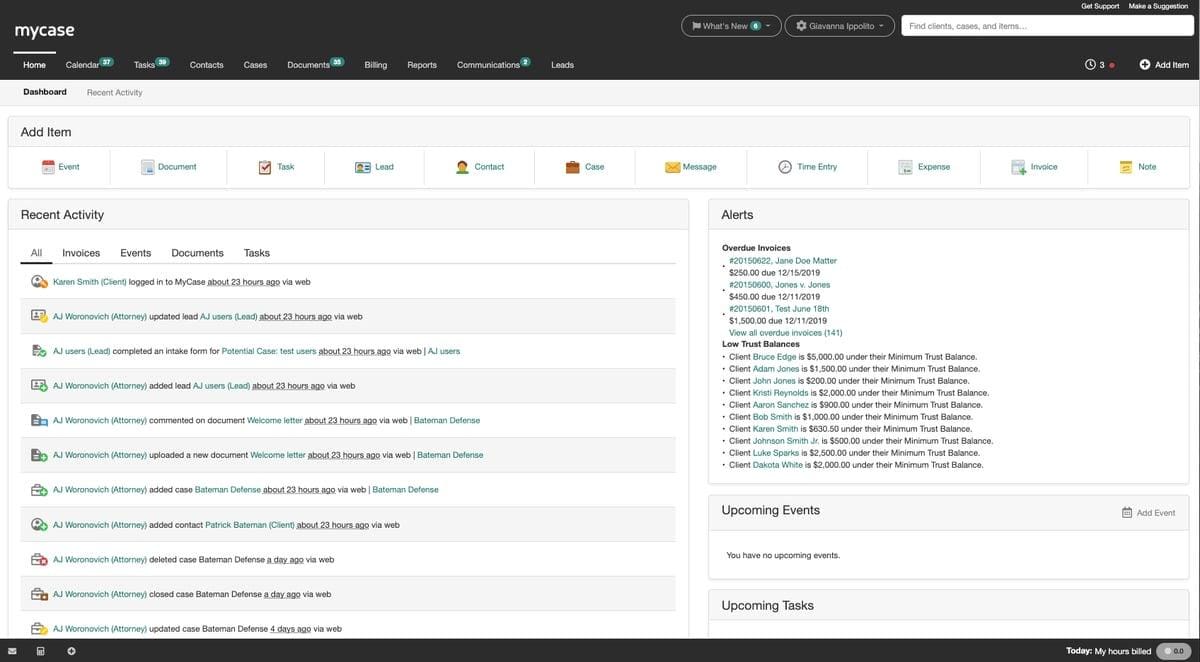
Source: G2
MyCase is especially helpful for small to mid-sized firms that want a simple way to manage client files, track time, send invoices, and communicate—all without leaving the dashboard.
Best Features
- Centralized document management: Store, share, and access files securely from anywhere.
- Built-in client portal: Clients can view documents, messages, and invoices in one place.
- Integrated time tracking: Log hours as you work and apply them directly to invoices.
- Automated billing: Create and send professional invoices with a few clicks.
Best Productivity Tools for Lawyers
Keeping everything on track gets tricky when you’re managing deadlines, documents, and daily chaos. Productivity tools help you organize work, get more done, and cut down on the back-and-forth while you handle the actual legal work.
4. Clio
Clio is legal software built to help legal professionals run their practice more efficiently. It brings together case management, billing, calendaring, and secure communication into one platform.
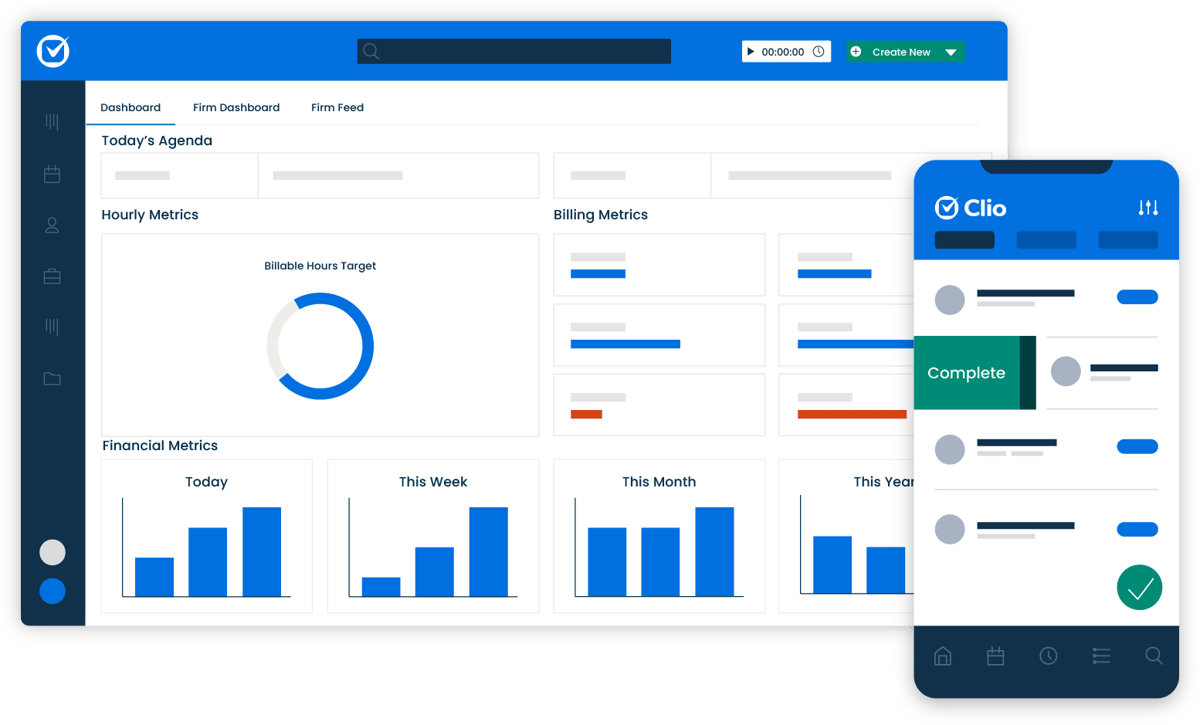
Source: G2
Whether you’re managing a solo practice or a midsize firm, Clio helps you cut down on routine tasks and stay organized.
Used across the legal services industry, Clio supports everything from time tracking to document storage, giving legal professionals more control over how they work. It’s a solid piece of legal technology that keeps things moving without the mess.
Best Features
- Full practice management: Keep cases, tasks, and contacts organized in one place.
- Time tracking and billing: Record hours and send invoices directly through the platform.
- Calendar and deadline tools: Stay on schedule with built-in reminders and synced calendars.
- Client messaging and file sharing: Communicate securely through the client portal.
- Cloud access: Work from anywhere, whether you’re in the office or on the go.
- Integrations with other legal tools: Works smoothly with platforms like QuickBooks, LawPay, and Zoom.
5. Microsoft Office
Microsoft Office remains one of the most widely used document management tools in the legal profession. Even with newer platforms out there, many legal departments and firms still rely on Word, Excel, Outlook, and PowerPoint to handle everyday tasks.
Source: G2
Microsoft Word is often the go-to for drafting motions, contracts, and letters. Excel helps track billable hours, manage budgets, and organize case data. Outlook keeps emails and scheduling under control.
These tools may not be flashy, but they’re reliable and familiar, which makes a big difference when you’re working under pressure.
Best Features
- Word processing for legal docs: Draft contracts, pleadings, and templates with advanced formatting.
- Spreadsheet tracking: Use Excel for time logs, budget planning, and case summaries.
- Email and calendar sync: Outlook helps manage communication and deadlines in one place.
- File sharing and storage: Store and organize case documents with OneDrive and SharePoint.
- Trusted across the industry: Common in legal departments and firms of all sizes.
- Boosts law firm efficiency: Keeps daily workflows simple and consistent across teams.
6. Zapier
Zapier is a no-code automation tool that connects your favorite apps to reduce manual work across law firm operations. It’s not legal software in the traditional sense, but it pairs perfectly with practice management software to make things run smoother behind the scenes.
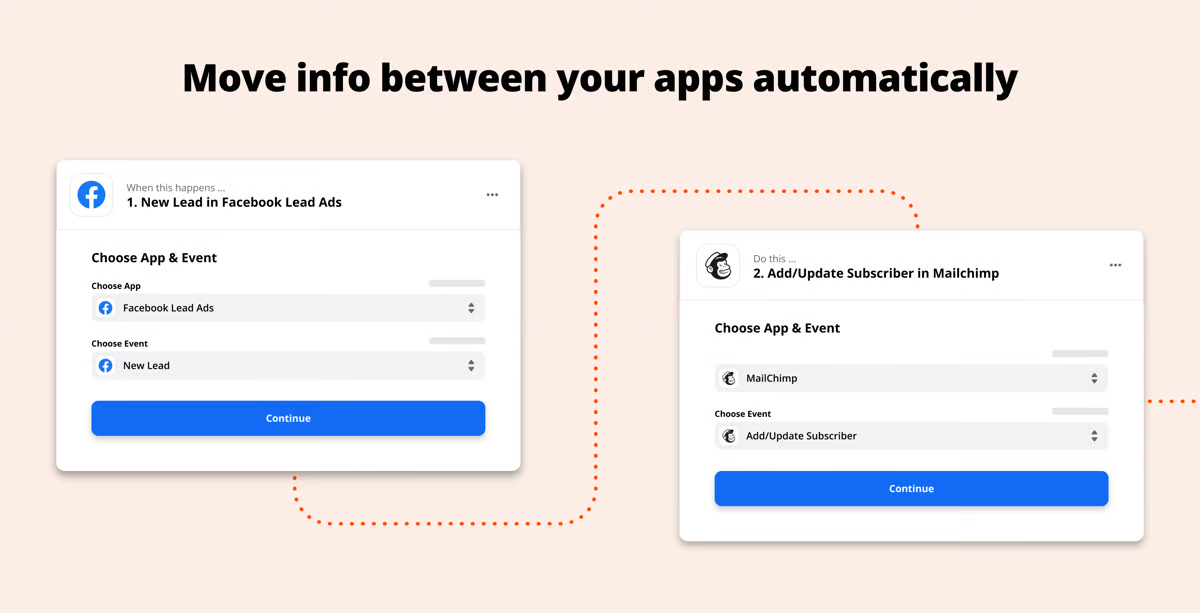
Source: G2
Legal teams can use Zapier to connect apps like Clio, Google Sheets, Outlook, and Slack. For example, you can automatically create calendar events when new tasks are added or get a Slack alert when a client fills out a form.
It’s also helpful for integrating AI tools into your workflow without needing a developer.
Best Features
- Works with legal tools: Connects with popular practice management software like Clio or MyCase.
- No-code automation: Set up workflows without writing a single line of code.
- Supports law firm operations: Handles repetitive admin tasks so your team can focus on real work.
- Customizable triggers and actions: Automate emails, reminders, and file uploads with ease.
- AI integration ready: Combine with AI tools to create smarter, faster processes.
- Ideal for legal teams: Helps streamline collaboration and task management across departments.
Best Accounting and Billing Tools for Law Firms
Staying on top of billing and finances is just as important as handling your cases. Hourly billing, flat fees, or contingency arrangements all need a system that helps track time and collect payments.
We’ve compiled some tools that can help your firm handle billing with less stress and more accuracy.
7. QuickBooks
QuickBooks is accounting software that helps law firms handle financial tasks while staying organized. It’s used across many industries, but legal professionals—especially at personal injury firms—often rely on it to manage expenses and keep their books in order.
Source: G2
QuickBooks also works well with time tracking software and other legal tools, which helps make it easier to manage everything from billable hours to payroll. For firms juggling legal tasks and financial records, this platform keeps things clear without adding extra steps.
Best Features
- Expense tracking: Categorize spending and monitor law firm expenses in real time.
- Invoicing tools: Create, send, and track professional invoices for client matters.
- Bank syncing: Connect business accounts to see accurate balances and transactions.
- Time tracking integration: Works with time tracking software for precise billing.
- Custom reports: Build financial reports for monthly reviews or audits.
- Built for flexibility: A solid fit for personal injury firms, small practices, and growing legal teams.
8. LawPay
LawPay is payment processing software built specifically for law firms. It lets you accept credit card and ACH payments while staying compliant with legal and accounting rules.
LawPay is approved by bar associations across the country, which is why it’s a trusted option for handling sensitive client data securely.

Source: G2
It integrates with multiple tools that legal professionals already use, including practice management systems and accounting software. If you’re already using such software, adding LawPay can help complete your billing setup with little to no hassle.
Best Features
- Legal-specific payment processing: Keeps operating and trust accounts separate.
- Secure handling of sensitive client data: Built to protect payment details and client trust.
- Bar-approved compliance: Meets the rules for professional conduct and trust accounting.
- Works with multiple tools: Integrates with platforms like Clio, MyCase, and QuickBooks.
- Flexible payment options: Accepts credit cards and ACH transfers with ease.
- Simple setup: Get started quickly and start receiving payments faster.
Best Communication Tools for Lawyers
Keeping everyone in the loop takes more than just email. Clients expect timely updates, your team needs quick answers, and there’s always something that needs your attention.
Take a look at these tools that can help you manage conversations and stay on top of things.
9. Slack
Slack is a messaging platform that helps legal teams communicate quickly and stay organized. Many firms use it to replace traditional methods like long email threads and scattered group texts.
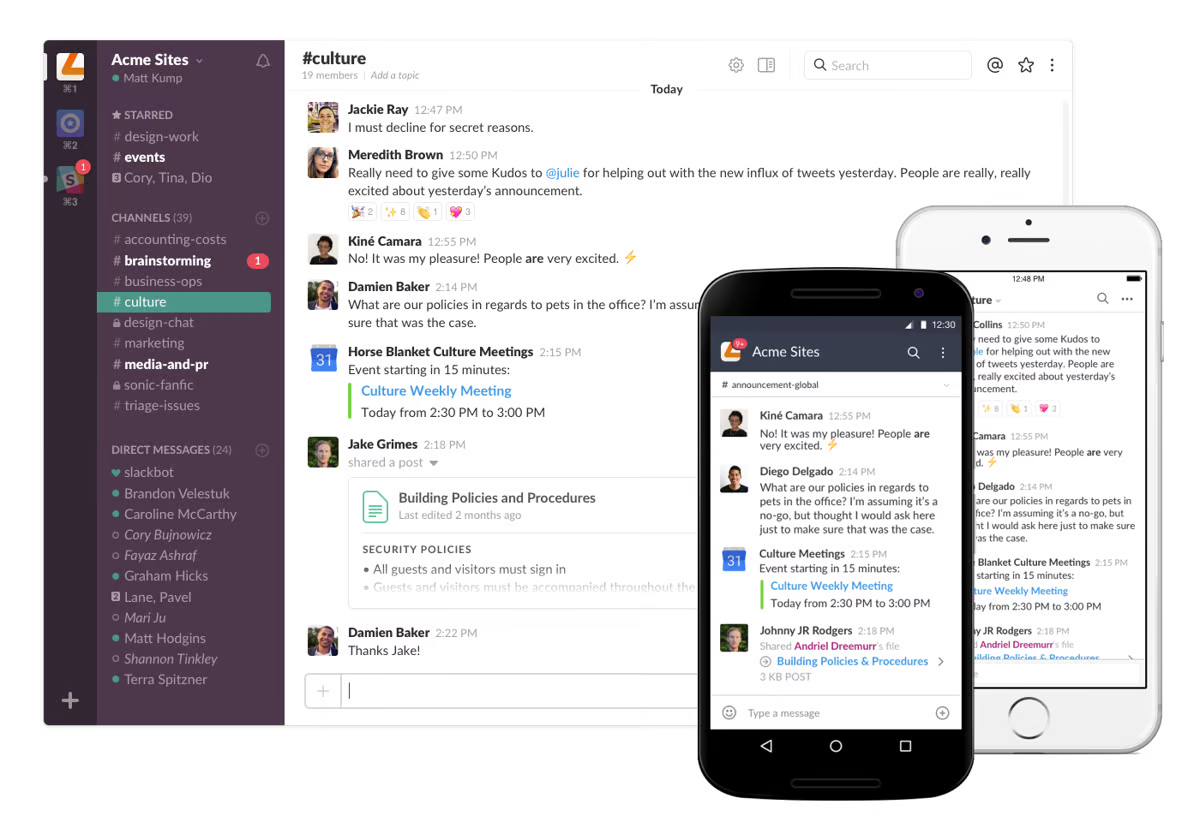
Source: G2
With Slack, everything stays in one place, such as messages, files, and updates, so you can spend less time digging through inboxes.
It’s also a helpful way to access documents, share case updates, and automate routine tasks through integrations with legal tools, calendars, and AI assistants.
Best Features
- Organized channels: Create dedicated spaces for cases, departments, or projects.
- Real-time messaging: Chat with your team instantly, without clogging your inbox.
- Easy document sharing: Access documents and files right in the conversation.
- Searchable history: Find messages, attachments, and case info fast.
- Works with many tools: Integrates with calendars, task apps, and legal software.
- Supports firm workflows: Helps automate routine and complex tasks and streamline updates across your team.
10. Zoom
As you probably know by now, Zoom is a video conferencing tool that makes virtual meetings simple for law firms. It’s widely used to meet with clients, hold team check-ins, and even attend remote hearings.
Thanks to high-quality video and easy screen sharing, Zoom helps legal professionals communicate clearly and keep meetings on track.
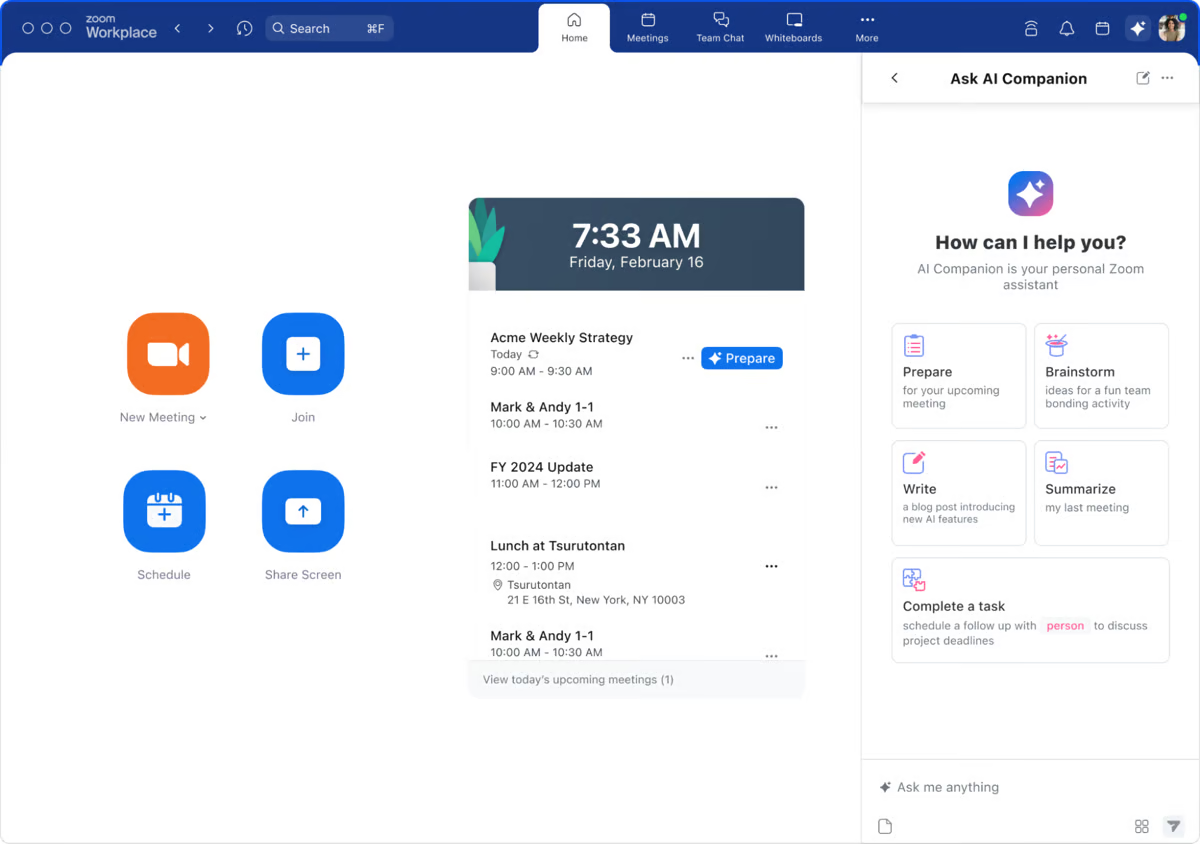
Source: G2
Using Zoom can improve productivity by cutting down on travel and scheduling delays. It also helps firms meet with more clients (no matter where they are) and streamline workflows by bringing face-to-face conversations online.
Best Features
- Reliable video meetings: Host secure, high-quality calls with clients and colleagues.
- Screen sharing: Review documents and presentations in real time.
- Meeting recordings: Save sessions for internal review or follow-up.
- Calendar integrations: Sync meetings with Outlook, Google Calendar, and more.
- Flexible scheduling: Book and join meetings from anywhere, on any device.
- Increases efficiency: Helps legal teams improve productivity and streamline client communication.
Best Legal Research Tools
Legal research can take up a big chunk of your day, especially when you’re juggling multiple cases. The right tools help you find case law, statutes, and legal opinions faster and with more accuracy. Here are a few of our suggestions:
11. CoCounsel (Casetext)
CoCounsel (formerly Casetext) is a legal research platform that helps you find relevant case law quickly and accurately. It uses AI to scan your arguments and match them with supporting cases, cutting down the time you’d usually spend digging through databases.
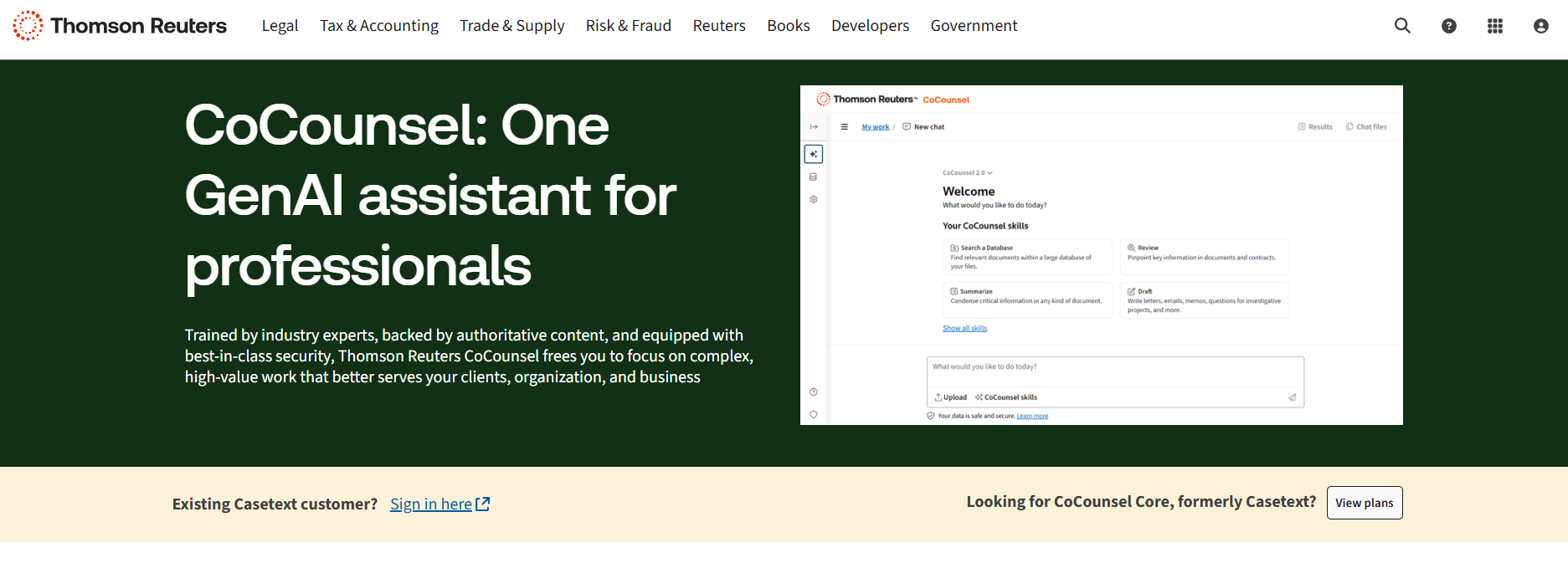
Source: ThomsonReuters.com
CoCounsel isn’t just a search tool. It’s built to support modern legal operations by connecting legal data, key documents, and arguments in one place. It also works alongside e-discovery tools, which can help you prepare stronger briefs with less back-and-forth.
Best Features
- AI-powered research: Analyze your writing and get case law suggestions that match your arguments.
- Search by concept: Go beyond keywords and search by legal ideas or outcomes.
- Works with key documents: Upload briefs or memos to find supporting cases instantly.
- Access to legal data: Explore statutes, regulations, and court opinions in one place.
- Supports legal operations: Speeds up research for teams working on multiple matters.
- Integrates with ediscovery tools: Helps connect research with your broader case preparation process.
12. LexisNexis
LexisNexis is one of the most well-known legal research tools used by firms, legal departments, and solo attorneys.

Source: LexisNexis.com
It gives you instant access to a massive database of case law, statutes, regulations, and legal commentary. Designed to increase productivity, it helps you find the information you need without jumping between different sources.
LexisNexis also includes AI capabilities and natural language processing, so it’s easier to search in plain English. You don’t have to think like a database; you just type your question or phrase, and it brings up relevant legal materials fast.
Best Features
- Comprehensive legal database: Access case law, statutes, and secondary sources in one place.
- Natural language search: Find legal content using everyday language instead of complex queries.
- AI capabilities: Smart filters and recommendations help you refine results quickly.
- Instant access to legal content: Search from anywhere with cloud-based tools.
- Practical guidance: Includes checklists, forms, and how-to materials for different practice areas.
- Productivity-focused tools: Built-in tools help legal teams research faster.
13. Fastcase
Fastcase is another legal research tool that gives lawyers access to a large database of case law, statutes, regulations, and court rules. It can help legal professionals find answers quickly and stay focused on the task at hand.
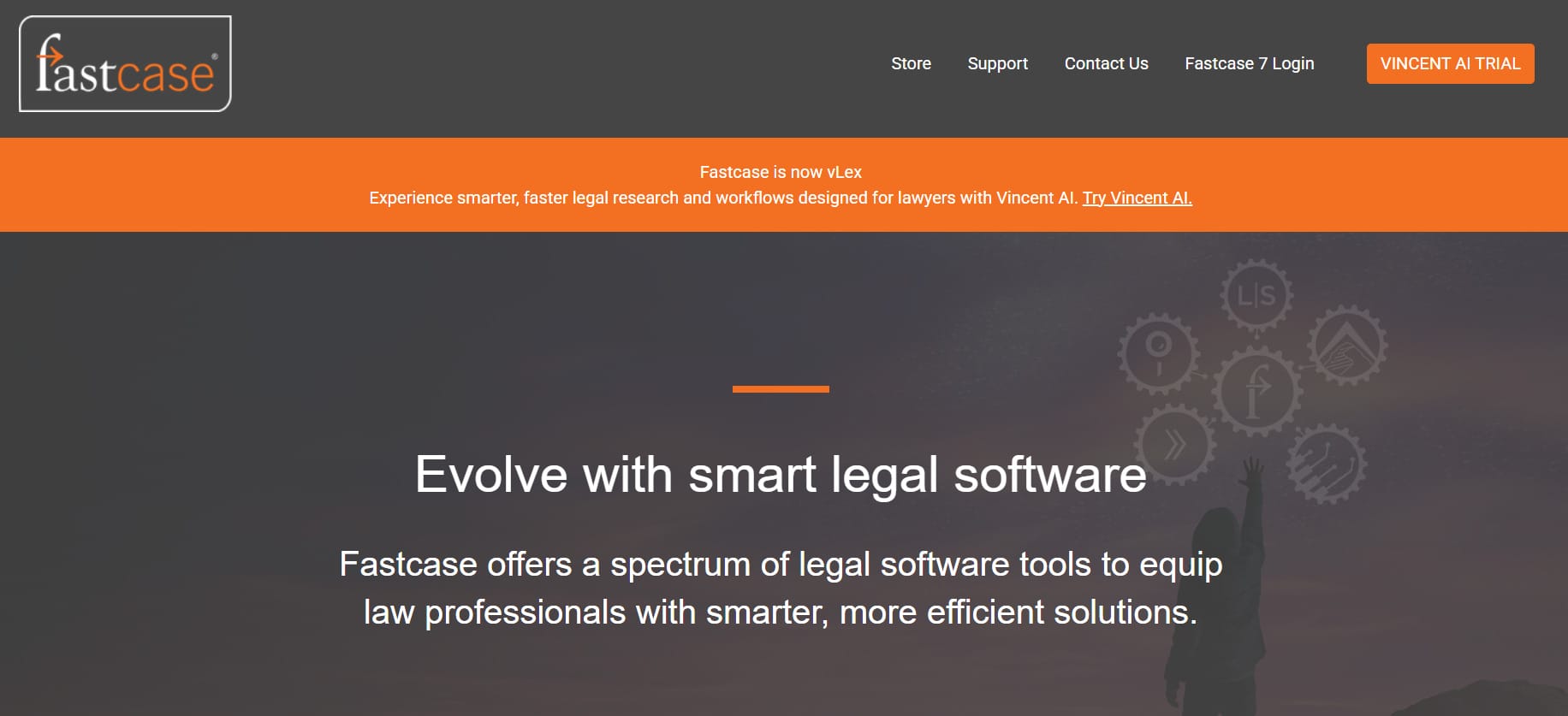
Source: Fastcase.com
Many bar associations offer Fastcase for free to their members, which makes it a smart option for solo attorneys and small firms. It’s designed with speed in mind and includes features that let you search by keyword, citation, or natural language.
Best Features
- Extensive legal database: Search case law, statutes, court rules, and more.
- Natural language search: Type in questions or phrases to find relevant results fast.
- Data visualization tools: Spot trends and citation relationships at a glance.
- Mobile app access: Use it on the go from your phone or tablet.
- Bar association access: Included with membership in many state bar organizations.
- Budget-friendly legal research: A solid alternative for firms looking to cut research costs.
Start Building Your Tech Stack With Briefpoint
Every firm has its own way of working, but the right tools can make a big difference, especially when you’re handling multiple documents, juggling deadlines, and managing client expectations. Briefpoint gives you a head start by taking care of the repetitive tasks that slow you down.

While other firms are still stuck formatting templates and typing out objections, you could already be on to the next case. Building your tech stack doesn’t have to be overwhelming. Start with one tool that makes a clear impact.
Briefpoint is that tool. Book a demo today and see how much time you can get back.
FAQs About Lawyer Tools
What kind of equipment does a lawyer use?
Lawyers rely on more than just pens and legal pads. Today’s legal professionals use a mix of digital tools to manage cases, handle billing, and reduce human error. This includes practice management software, document automation tools, secure communication platforms, and accounting systems. Many of these tools are designed to fit into existing workflows and help lawyers save valuable time on routine tasks.
What is the best legal AI tool?
The best legal AI tool depends on what you’re trying to do. For contract drafting, tools that use large language models are gaining traction for speeding up review and reducing hours spent on repetitive work. Tools like Briefpoint are designed to help with discovery responses, using AI to draft documents faster than a human can, while still keeping you in full control. These tools don’t replace lawyers but work alongside them to enhance efficiency and support due diligence.
What are the best organizational tools for lawyers?
Great organization starts with tools that can actually support the way legal professionals work. Clio, MyCase, and Microsoft Office remain top picks for keeping documents, deadlines, and case notes in order. These platforms help you gain access to everything in one place, reducing the back-and-forth and cutting down on the time wasted searching for files. When paired with tools like Zapier, they also help automate smaller steps.
The information provided on this website does not, and is not intended to, constitute legal advice; instead, all information, content, and materials available on this site are for general informational purposes only. Information on this website may not constitute the most up-to-date legal or other information.
This website contains links to other third-party websites. Such links are only for the convenience of the reader, user or browser. Readers of this website should contact their attorney to obtain advice with respect to any particular legal matter. No reader, user, or browser of this site should act or refrain from acting on the basis of information on this site without first seeking legal advice from counsel in the relevant jurisdiction. Only your individual attorney can provide assurances that the information contained herein – and your interpretation of it – is applicable or appropriate to your particular situation. Use of, and access to, this website or any of the links or resources contained within the site do not create an attorney-client relationship between the reader, user, or browser and website authors, contributors, contributing law firms, or committee members and their respective employers.
Top 5 Smokeball Integrations Law Firms Should Know
Top 5 Smokeball Integrations Law Firms Should Know
Tired of jumping between tools and redoing the same tasks in your practice? Smokeball integrations were built to fix that.
They help you connect the software you already use, cut down on repetitive work, and keep everything tied to your matters, without making things more complicated.
This guide covers the most helpful Smokeball integrations and how they actually work. From billing and emails to meetings and document drafting, these tools can help you stay organized, save time, and focus on what really needs your attention.

What Are Smokeball Integrations?
Smokeball integrations are simply other tools that connect with Smokeball so you can work faster and cleaner. Instead of hopping between platforms or redoing work, these integrations let everything sync, which helps you save time and build a more profitable, organized firm.
For example, you can:
- Send emails in Outlook and automatically save them to your Smokeball matters
- Push bills into QuickBooks without manual entry
- Connect templates and documents through Briefpoint
- Run Zoom meetings directly from your calendar
- Automate tasks with Zapier
These tools help you keep better track of your clients, fees, and leads while making sure your data stays in the right place.
Best Integrations For Smokeball
You don’t need every integration under the sun. But a handful of the right ones can really change how your day goes. We’ve compiled some of the most helpful Smokeball integrations to consider.
1. Briefpoint
Briefpoint is built for law firms that want to handle discovery faster without cutting corners. When paired with Smokeball, it lets you create key legal documents in minutes and automatically saves them to the correct matter folder—no setup or manual sorting needed.

Here’s what you can generate with Briefpoint:
- Requests for Admission
- Requests for Production
- Interrogatories
- Responses to all of the above
How it works:
- Upload the .pdf (like a complaint or discovery request)
- Choose your objections and add responses
- Download your draft in Word and finish it up
Briefpoint reads court names, case numbers, and request types from your upload and fills in the basics, following local formatting rules. You handle the legal substance while Briefpoint handles the busywork.
Smokeball users love Briefpoint because it saves serious time, reduces non-billable hours, and keeps everything organized automatically. You won’t need to juggle files or retype client info. It works across all 50 states and D.C., and it’s simple enough for any attorney to use.
With strong encryption and no data shared for training AI, it’s also a secure choice for firms that care about privacy.
Book your demo today and see how it works!
2. QuickBooks
QuickBooks is a solid pick for firms that want to keep their finances clean and up to date. When linked with Smokeball, it brings all your billing, expenses, and payments together without the usual hassle. Instead of jumping between tools, you can manage everything in one place.
Here’s why it’s worth connecting QuickBooks with Smokeball:
- Syncs client bills and payments with a single click
- Keeps expenses and financial data updated automatically
- Pulls in contact information from your matters
- Cuts down on manual entry with smart automation
- Helps you track what’s owed and what’s paid
- Makes tax time and reporting way easier
- Lets your team focus on legal work, not accounting
With this setup, you don’t have to second-guess what’s been billed or paid. Everything stays current, accurate, and easy to access.
3. Microsoft Outlook
Microsoft Outlook is one of the most useful integrations for Smokeball, especially if you’re already using it to manage your emails.
Once connected, it helps you stay organized by linking emails, attachments, and contact details directly to your Smokeball matters. This way, all your communication stays in one place, easy to find, and tied to the right client or case.
With Outlook and Smokeball, you can:
- Save emails and attachments to the right matter
- Sync client contact information
- Log sent and received messages automatically
- Keep communication clear, updated, and easy to review

4. Zoom
Zoom makes it easy to meet with clients or team members without skipping a beat. And when you connect Zoom with Smokeball, those meetings get even easier to manage. You can schedule Zoom calls straight from your Smokeball calendar, and everything stays linked to the right matter.
There’s no need to run between apps or worry about losing track of meeting info. With the Smokeball logo right there in your workflow, you’ll know your details are in the right place.
Key benefits of connecting Zoom with Smokeball:
- Schedule and launch calls from your Smokeball calendar
- Keep meeting links and notes tied to each matter
- Cut down on back-and-forth emails
- Stay focused when you need to run your day smoothly
5. Zapier
Zapier is a powerful tool that helps you connect Smokeball with thousands of other apps, from Gmail and Slack to Google Drive and beyond. It’s good for law firms that want to run a more profitable operation without adding more manual work to their plate.
You can build simple workflows, called “Zaps,” that move data between tools automatically. Once set up, you won’t have to think about it again.
Why use Zapier with Smokeball:
- Connect Smokeball with other popular tools
- Automate repetitive tasks and save time
- Keep everything you need in one place
- Focus on legal work while Zapier handles the rest
Make the Most Out of Smokeball, Connect Briefpoint Today
If you’re using Smokeball to stay organized and efficient, Briefpoint is the perfect next step. It takes the most time-consuming part of litigation—drafting discovery documents—and makes it fast, accurate, and stress-free.

With just a few clicks, you’ll have clean, formatted documents saved right to your Smokeball matters, ready to review or send.
This isn’t just about saving time. It’s about working smarter, cutting down non-billable hours, and focusing on the parts of your practice that really matter.
Ready to simplify your workflow and boost productivity? Learn more about Briefpoint today!
FAQs About Smokeball Integrations
Does Smokeball integrate with QuickBooks?
Yes, Smokeball integrates with QuickBooks Online. This connection helps sync invoices, payments, and expenses automatically, so you can keep your financial records updated without manual entry.
Does Smokeball integrate with Gmail?
Smokeball integrates directly with Microsoft Outlook, but you can still connect Gmail using tools like Zapier. This setup lets you automate email workflows and keep your communication organized.
Is Smokeball better than LEAP?
Both are solid legal practice management tools, but the right one depends on your firm’s needs. Smokeball focuses on productivity and built-in automation, while LEAP leans more into document management. Many small to mid-size firms prefer Smokeball for its simplicity and customer support.
The information provided on this website does not, and is not intended to, constitute legal advice; instead, all information, content, and materials available on this site are for general informational purposes only. Information on this website may not constitute the most up-to-date legal or other information.
This website contains links to other third-party websites. Such links are only for the convenience of the reader, user or browser. Readers of this website should contact their attorney to obtain advice with respect to any particular legal matter. No reader, user, or browser of this site should act or refrain from acting on the basis of information on this site without first seeking legal advice from counsel in the relevant jurisdiction. Only your individual attorney can provide assurances that the information contained herein – and your interpretation of it – is applicable or appropriate to your particular situation. Use of, and access to, this website or any of the links or resources contained within the site do not create an attorney-client relationship between the reader, user, or browser and website authors, contributors, contributing law firms, or committee members and their respective employers.
21 Best Software Programs for Law Firms
21 Best Software Programs for Law Firms
Accuracy, consistency, and quality of service are three of the most important pillars in the legal industry. Unsurprisingly, it takes a lot of time and effort to meet all of these standards for every client you take in, which are resources that tend to be scarce in any busy law firm.
But what if you could abide by these pillars and optimize your workflows without sacrificing even more time and energy?
Software solutions for law firms are designed for this very purpose. Some tools can help you manage your entire practice all on one platform. Others handle the nitty-gritty of a specific task, such as discovery document drafting or tracking billable hours.
However, out of all the tools available, how do you know which ones to add to your tech stack?
In this guide, we’ll review the best software programs for law firms per category. We’re about to get up close and personal with what they offer and why you should give them serious thought.

Why Use Legal Software?
Before we get into the top legal software programs of 2026, let’s find out why you should be using them in the first place.
Here are some of the most important advantages of using legal software:
It Saves You Time
Legal work involves tasks that can take up your day, such as drafting documents, scheduling meetings, and handling invoices. Doing these manually is a time drain and a huge hurdle to ideal time management.
Legal software automates these routine jobs and lets you breeze through them quickly. As a result, you’ll have the bandwidth to concentrate on high-leverage activities, like forging strong client connections and developing sound case strategies that deliver results.
It Helps You Avoid Mistakes
In law, accuracy isn’t just important—it’s everything. A tiny error can lead to big headaches down the road, and when you’re doing things manually, there’s always a risk of something slipping through the cracks.
With legal software handling the heavy lifting, you can breathe easy, knowing your documents are accurate and consistent. No more pouring over templates for hours on end and worrying about missed details or typos that could cause problems later on.
It Upgrades Your Efficiency
Running a law firm means juggling many things like cases, clients, documents, billing, you name it. Legal software acts like a central hub where you can manage everything in one place.
This not only organizes your workflow but also makes it easier for your team to collaborate and stay on the same page. When everything’s organized and easily accessible, you can work faster and more efficiently, which is good news for your firm and your clients.
It Improves Client Service
Clients expect quick responses, clear communication, and timely case updates. Thanks to law firm software, you can confidently meet these expectations.
With tools for client management, automated reminders, and easy access to case information, you can stay on top of client needs and provide a level of service that keeps them satisfied and coming back for more.
Plus, it helps you maintain a professional image, which is always a bonus.
It Increases Law Firm Profitability
At the end of the day, one of the biggest benefits of legal software is how it can maximize your firm’s bottom line.
By saving time, reducing errors, and improving efficiency, legal software allows you to focus more on billable work and less on administrative tasks. This means more productive hours, better client retention, and, ultimately, increased profitability for your firm.
When you can handle more clients or cases without expanding your team, your revenue per lawyer goes up while your costs stay the same or even decrease.
21 Best Legal Software Programs by Category
When it comes to running a law office, having the right software can make all the difference. But with so many options out there, it can be tough to know where to start. To help you out, we’ve broken down the top legal software programs by category.
Whether you need to automate documents, manage cases, or streamline your billing, there’s something here that’ll fit the bill.
Legal Document Automation Software
Legal document automation software is a real lifesaver if you’re buried under a mountain of paperwork. No more starting from scratch!
These document assembly tools empower you to generate intricate legal documents rapidly without reinventing the wheel every single time. Just plug in the details, and the software does the heavy lifting.
1. Briefpoint
Briefpoint is a platform that uses generative artificial intelligence to automate the creation of discovery documents, such as requests for production, requests for admission, and interrogatories.
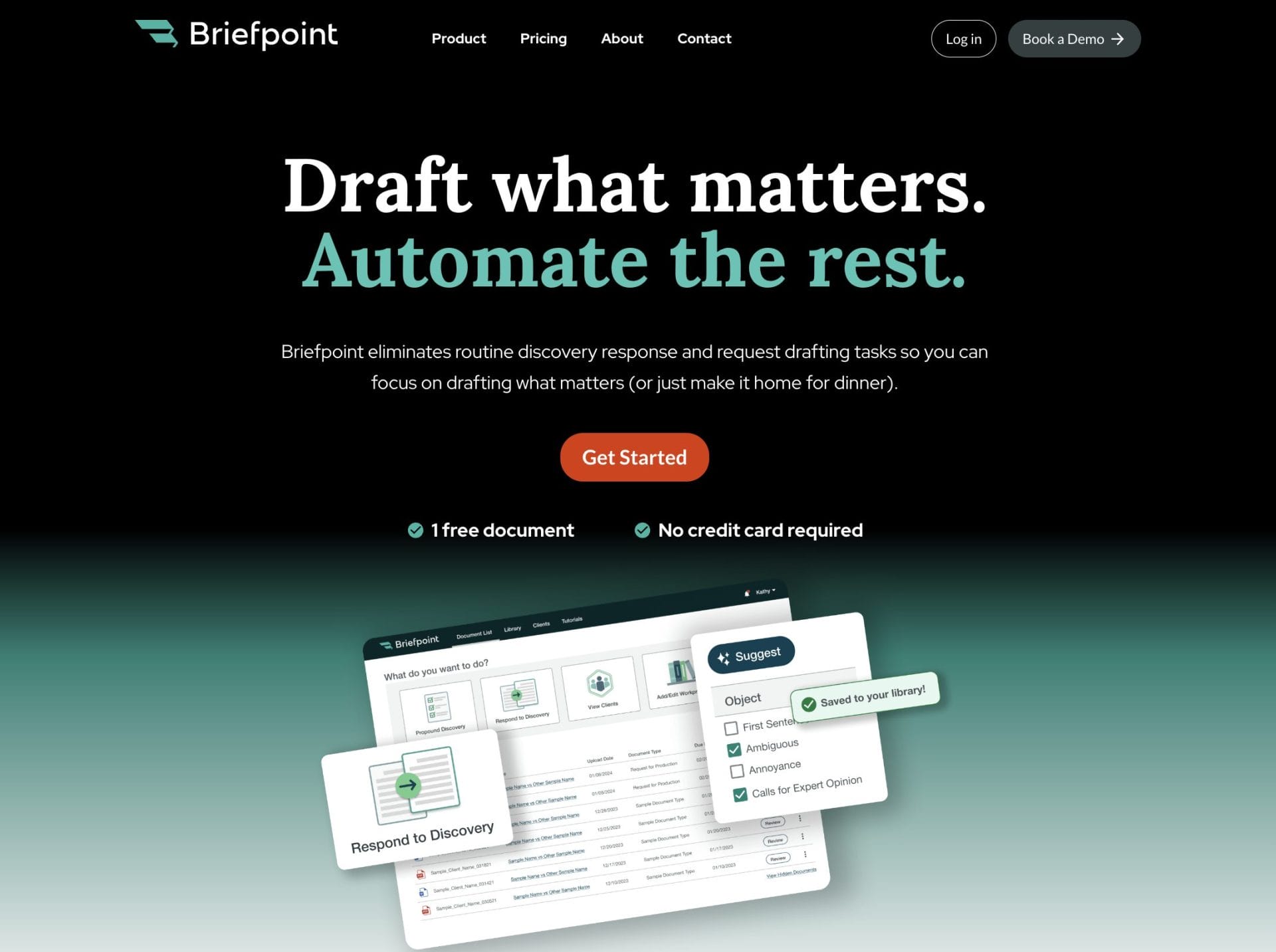
Drafting these documents manually can take hours, perhaps even days or weeks, if you’re going back and forth with client responses. Briefpoint is designed to take all the hassle out of the process by using AI and machine learning to do all the routine stuff.
Here’s how it works:
- You upload your discovery request to Briefpoint
- Briefpoint’s AI will scan the document and extract as much information as it can
- Briefpoint automatically collects your clients’ responses and objects to each request
- You download your document and apply the finishing touches in MS Word
Client responses are also much easier to handle, thanks to Briefpoint Bridge. This feature lets you select the interrogatories you want your client to answer, add notes to make them easier to fill out, and then send your client a link to the portal where they can input their responses.
Once they’re done, you can edit and plug in their responses to your discovery document, and that’s it. You no longer have to suffer through the endless back-and-forth emailing just to collect client responses.
Now, with the new Propound Discovery feature, you can upload a complaint (in .pdf format), and Briefpoint will use the information to draft a set of interrogatories, requests for the production of documents (RFPs), and requests for admission (RFAs).
With this feature, instead of focusing solely on answers to discovery questions, you can use Briefpoint to create the discovery questions you need. Once generated, you can edit, reorder, remove, and add new questions and download the request as a file.
2. Knackly
Knackly is a standout when it comes to flexibility in document automation. If your firm deals with a variety of legal documents that need to be customized to fit specific situations, Knackly is a suitable tool.
It allows you to create tailored templates that match your exact needs, which saves you from having to start from scratch each time. Knackly’s easy-to-use interface makes it simple to input the necessary information, and the software takes care of the rest, generating accurate and professional documents in no time.
This adaptability is a game-changer for legal teams that handle non-traditional cases.
3. Smokeball
Picture this: a law firm where paperwork disappears and billable hours skyrocket. Smokeball makes this a reality by centralizing data, simplifying time tracking, and turbocharging collaboration. With Smokeball, lawyers can dominate their caseloads and savor the rewards.
What makes Smokeball stand out is how it integrates document automation with practice management features. You can easily generate documents using customizable templates, which helps make sure that everything you produce is consistent and accurate.
It also includes tools for managing cases, billing clients, and even communicating with them, all within the same platform.
Law Practice Management Software
Managing a law firm involves a lot of moving parts, like cases, clients, schedules, and billing. This is precisely why you need legal practice management software or project management software.
The more time you spend on administrative tasks, the less time you have for your clients. These tools flip that script, giving you the freedom to prioritize high-touch service and forge meaningful connections with your clients. Here’s a look at three of the best options out there:
4. Clio
Law firms of all shapes and sizes consistently choose Clio. Its extensive set of tools makes it possible to run a law practice smoothly, giving lawyers the power to handle anything that comes their way.
With Clio, you can manage cases, track billable hours, send invoices, and communicate with clients, all from one intuitive platform. What sets this system apart is its ability to adapt to your firm’s requirements.
Plus, whether you’re a solo practitioner or part of a larger team, Clio scales to meet your requirements.
5. PracticePanther
PracticePanther is another strong contender in the world of law practice management software. It’s designed to be user-friendly, which makes it easy to get up and running quickly. It handles everything from case management and billing to client communication and document storage.
It’s especially appealing for smaller firms that need advanced features without the steep learning curve. Plus, with its mobile app, you can manage your practice on the go, which helps make sure you’re always connected to your work, even when you’re out of the office.
6. MyCase
MyCase is a solid option for firms looking for an all-in-one solution. It offers a balanced mix of features that cover case management, billing, document storage, and client communication.
MyCase is mainly known for its user-friendly design and strong customer support, making it a favorite among solo practitioners and small firms.
Legal Research
Legal research is a cornerstone of any lawyer’s work, but it doesn’t have to be a slog. With the right software, you can speed up the process, find what you need with ease, and see to it that your arguments are backed by solid precedents.
You’re in luck–we’ve got two effective solutions to share with you.
7. FindLaw
FindLaw has been a trusted resource for anyone practicing law. It offers a vast database of legal information that’s easy to access. Whether you’re digging into case law or statutes or just need the latest legal news, FindLaw can be a useful tool.
Solo legal professionals and small firms get reliable info that won’t break the bank. You’ll appreciate how quickly you can tap into the platform’s resources and get back to making headway on your cases.
8. Casetext
Casetext takes legal research up a notch by incorporating AI to make your work even more efficient. With their CARA AI technology, you can upload briefs or motions, and the software will find relevant cases and statutes you might have missed.
It’s like having a second set of eyes on your research that makes sure you don’t overlook anything important.
With Casetext, attorneys can say goodbye to fruitless searching and welcome swift, accurate answers—it’s the secret to getting the best possible results in the least amount of time.
Contract Management Software
Managing contracts is vital for any law firm, but it can often feel overwhelming. What if you could take the strain out of contract management? By leveraging the right software, you can craft, revise, sign, and store your contracts with ease, sans the headache.
Let’s examine two top tools that can help you manage contracts more efficiently and with less hassle.
9. Ironclad
Dealing with an avalanche of contracts is no longer a burden, thanks to Ironclad’s dynamic management system. This system rallies and shapes the contracts into a sensible order, unlocking the full potential of firms handling massive volumes.
It’s not just about storing documents—Ironclad automates the entire contract process, from creation to execution.
With contract drafting made effortless, you’ll speed through templates that adapt to your needs in no time. Once your contract is ready, Ironclad makes it easy to manage the review and approval stages, keeping everything organized and ensuring nothing falls through the cracks.
10. PandaDoc
PandaDoc is another great option for contract management, especially if you’re looking for something that’s easy to use and integrates well with other tools you might already have.
With PandaDoc, you can breeze through the contract process, crafting and fine-tuning agreements in no time, then sending them off for signatures with a mere few clicks.
One of the standout features is how well PandaDoc integrates with other software, like CRM or billing tools, making it a versatile addition to your practice. It’s a good solution for firms that want to simplify their contract workflows without a steep learning curve.

Legal Billing Software
Time tracking and billing are another tedious yet critical aspect of running a legal practice. You want every billable second to count, but without the right tool, things like time tracking, invoicing, and billing can easily add to your already piling to-do list.
Use one of these top three billing and accounting software instead:
11. LawPay
If you’re a law firm struggling with billing and payment processing, LawPay is likely your best bet. Its design is tailored to the legal profession, and it shows in the results. It’s fully compliant with legal ethics requirements, so you can trust that client funds are handled correctly.
With LawPay, you can easily send invoices, collect payments online, and monitor your billing, all in one convenient, protected space.
12. FreshBooks
Small businesses and solo operators love FreshBooks, a straightforward billing and invoicing tool that lets them focus on what they do best. Imagine creating invoices, tracking time, and staying organized with expenses—all in one seamless workflow. That’s exactly what this powerful tool offers.
With FreshBooks, clients get a portal where they can review invoices and pay online with no hassle. While its design doesn’t specifically cater to law firms, this billing software’s flexibility and simplicity have won fans.
13. LeanLaw
LeanLaw is billing software built for law firms, especially those using QuickBooks. It integrates seamlessly with QuickBooks Online, so it’s easy to track time, generate invoices, and manage finances all in one place.
LeanLaw is designed to simplify the billing process and ensure that every billable minute is accounted for. It’s a great option for firms that want to streamline their billing while maintaining a clear overview of their financials.
Client Relationship Management Software
Building and maintaining strong client relationships is key to a successful law firm, and that’s where client relationship management (CRM) software comes in.
These tools help you keep track of client interactions, automate follow-ups, and make sure no potential client slips through the cracks. We’ve found one option specifically made for law firms:
14. Lawmatics
Lawmatics is a CRM designed specifically for law firms. Typically, CRM tools are a one-size-fits-all affair, but this one understands that law firms have unique demographics, hurdles, and priorities—and it rises to meet those challenges head-on.
Lawmatics helps you manage every stage of your client relationships, from the first contact to ongoing case management. One of the things that makes Lawmatics stand out is its automation of follow-ups, so you never lose track of a potential client.
From a single glance, you can see exactly where every lead and referral stands, making it simplicity itself to pinpoint opportunities and fine-tune your strategy. With this intuitive tool, you’ll find itinerant and frustrated clients transforming into happy loyalists in no time.
Document Management Software
Document management can be a real pain for law firms because they deal with a massive amount of sensitive documents that need to be securely stored, organized, and easily accessible.
Carefully handle confidential information, follow legal guidelines, and manage different versions of your work—it’s a tall order, especially without the right support.
So, here are two great tools with document management functionality:
15. OneDrive
Whether you’re working on a project with teammates or just need to grab a file on the go, OneDrive makes it easy to stash and share your stuff.
Keeping your documents safe and sound is a top priority, and that’s exactly what OneDrive from Microsoft offers–a rock-solid storage option that puts your mind at ease. What’s nice about OneDrive is that you can access your files from anywhere, whether you’re in the office, at home, or on the go.
It integrates seamlessly with Microsoft Office, so editing documents right in OneDrive is a breeze.
Plus, with Microsoft’s robust security features, you can rest easy knowing that your client information is safe. If your firm already uses Microsoft products, OneDrive is a no-brainer for managing your documents.
16. Dropbox
Dropbox is user-friendly, and it makes storing and sharing documents with your team or clients a snap. It also has a handy version history feature, so if you ever need to roll back to a previous version of a document, you can do it without any hassle.
Thanks to its compatibility with other tools, you can easily slot it into your current workflow and get back to being productive.
17. NetDocuments
Law firms and legal teams can now conquer document chaos with NetDocuments, a highly effective cloud-based management system designed specifically with their pain points in mind.
This tool combines three must-haves: bulletproof storage, version control, and effortless access from your laptop, phone, or tablet.

Task Management Tools
Keeping track of tasks and deadlines is crucial in a law firm, where missing a due date can have serious consequences. Using task management software means no more stressing about forgotten deadlines or overlooked tasks.
Want to breathe a little easier? Try one of these workload management solutions that have been battle-tested by firms just like yours.
18. Asana
Law firms, regardless of size, will find a reliable partner in Asana. This powerhouse lets you consolidate task creation, assignment, and tracking into one sleek, efficient package. A quick scan of the interface reveals exactly what you need to do and when, with no puzzle-solving required.
You can break down larger projects into smaller, more manageable tasks, set priorities, and even integrate with other tools your firm might be using.
19. ClickUp
With ClickUp, you get a dynamic system that painlessly switches between simple task management and large-scale project planning. The best part? You can fit the tool to your style, whether that means turning tasks into lists, organizing projects on boards, or planning your day around calendars.
ClickUp also offers time tracking, document management, and collaboration features, making it a comprehensive solution for law firms. If your team needs flexibility and a variety of features, ClickUp is a great option to keep everything running smoothly.
20. Trello
Trello is known for its simplicity and ease of use. With tasks displayed on a visual board, you can shift your attention between what needs doing, what’s due soon, and what’s been wrapped up.
For teams seeking simplicity, the drag-and-drop interface is the answer. With its straightforward design, you can effortlessly arrange tasks and concentrate on achieving your goals.
21. Notion
Notion is more than just a task manager. It’s a flexible tool that combines task management with note-taking, document storage, and collaboration.
It’s perfect for law firms that need a central hub for all their information. Taking charge of your projects has never been easier: simply craft workflows that mirror your firm’s specific needs, prioritize tasks, and watch your productivity soar.
Why Modern Law Firms Choose Briefpoint
Running a law firm comes with its fair share of challenges, but the right software can make all the difference.
Whether you’re looking to streamline document creation, manage your practice more efficiently, or keep better track of your billable hours, these tools are designed to help you work smarter, not harder.
If you’re ready to save time and cut costs, it’s time to give Briefpoint a try. This tool can transform the way you handle discovery, making the process faster and easier than ever.
Why not see the benefits for yourself? Schedule a demo today and find out how much your firm can save with Briefpoint.
FAQs About Software Solutions for Law Firms
What software do most law firms use?
Most law firms use a combination of tools for managing cases, billing, documents, and client relationships. Popular options include practice management software like Clio, MyCase, or PracticePanther—tools that help organize schedules, communications, and billing all in one place. Many also rely on document management systems such as NetDocuments, OneDrive, or Dropbox to securely store and organize legal files. Many of these tools offer a free trial so firms can explore what works best before committing.
What type of computer applications do most law firms use?
Law firms typically use applications for case management, billing, legal research, document automation, and document management. Microsoft Office remains a staple for everyday tasks, while legal-specific software like Briefpoint (for discovery documents) or LawPay (for billing) provides more targeted functionality. Combining these tools helps firms save time and follow best practices in managing their operations efficiently.
What is the best ERP system for law firms?
While traditional ERP systems are more common in large enterprises, law firms often look for ERP-style solutions built specifically for legal work. Platforms like Clio or Zola Suite come close, offering integrated features for billing, accounting, case management, and reporting. These are considered best practice management software because they centralize core functions, helping firms run smoothly while maintaining compliance. Some even offer a free trial so firms can explore the features firsthand.
What is CRM for law firms?
CRM (Customer Relationship Management) software for law firms helps track and manage client interactions, automate follow-ups, and organize leads. Unlike general-purpose CRMs, legal CRMs like Lawmatics are designed with lawyers in mind—they integrate with document management systems, scheduling tools, and email, making it easier to stay connected and responsive. Using a CRM is a best practice for firms focused on improving client retention and streamlining intake. Most providers offer a free trial so you can test how it fits your workflow
The information provided on this website does not, and is not intended to, constitute legal advice; instead, all information, content, and materials available on this site are for general informational purposes only. Information on this website may not constitute the most up-to-date legal or other information.
This website contains links to other third-party websites. Such links are only for the convenience of the reader, user or browser. Readers of this website should contact their attorney to obtain advice with respect to any particular legal matter. No reader, user, or browser of this site should act or refrain from acting on the basis of information on this site without first seeking legal advice from counsel in the relevant jurisdiction. Only your individual attorney can provide assurances that the information contained herein – and your interpretation of it – is applicable or appropriate to your particular situation. Use of, and access to, this website or any of the links or resources contained within the site do not create an attorney-client relationship between the reader, user, or browser and website authors, contributors, contributing law firms, or committee members and their respective employers.
New Technology for Law Firms: Legal Tech Trends of 2026
New Technology for Law Firms: Legal Tech Trends of 2026
Law firms aren’t working the way they used to—and that’s a good thing.
The old playbook of paper-heavy processes and manual workflows is being replaced with smarter, faster, and more connected systems. What once passed as efficient now slows firms down, especially with clients expecting speed, transparency, and digital convenience.
In 2026, top-performing firms are turning to legal tech not just to cut down on admin work but to rethink how legal services are delivered. From AI-driven research tools to automated discovery and virtual support, new technology is reshaping legal practice from the ground up.
Here’s a closer look at the tools and trends modern law firms are embracing and how they can help your team work smarter.

New Tech for the Legal Industry
If you’re looking to stay ahead of the curve, here’s a breakdown of the top legal technology trends shaping the industry in 2026.
1. Automation
Automation isn’t exactly new in the legal world. But what’s changing is how much smarter and more targeted it’s getting. It’s no longer just about filling out templates or flagging errors. Now, you can automate some of the most time-consuming parts of your workflow, like discovery.
Take Briefpoint as a prime example. If you’re still manually drafting responses to discovery requests, you’re spending hours on something that could take minutes.
Briefpoint automates the prep of discovery request and response documents, so you can stop getting bogged down in repetitive tasks and focus on the work that actually moves your cases forward. You simply have to upload your discovery document, and Briefpoint’s AI will do most of the routine tasks.
Even better? With Briefpoint Bridge, you can send clients plain-English versions of interrogatories, collect their answers, and plug them right into your docs—no back-and-forth, no confusion, no wasted time.
If you want to learn more about Briefpoint, book your demo today!
2. Legal Case Management Software
Legal case management software brings your documents, deadlines, billing, and communication into one place. This makes it easier to stay on top of various legal processes without getting buried in busywork.
By reducing administrative tasks, these platforms help enhance productivity across your team. You’ll spend less time tracking down case details and more time focusing on the legal work that matters.
Here are a few tools many firms are using today:
- Clio: A cloud-based solution that covers case tracking, secure communication, and billing—all designed to keep your firm running efficiently from anywhere.
- MyCase: Combines case management and client engagement tools in one user-friendly system, streamlining everyday workflows and helping you stay organized.
- Smokeball: Focuses on automation and customization, offering tools for managing administrative tasks while adapting to the needs of different practice areas.
If your firm is juggling too many disconnected systems, case management software can give you more control and clarity without adding to your workload.

3. Artificial Intelligence
Artificial intelligence is quickly becoming the engine behind smarter automation in law firms. While automation handles repetitive tasks, AI takes it further—learning from data, adapting to patterns, and making informed decisions in real time.
In practice, that means AI isn’t just doing things faster. It’s doing them more intelligently. It can sift through thousands of pages of legal text, flag risks in contracts, highlight case law, and even predict likely outcomes based on precedent.
These capabilities are already transforming areas like litigation prep, regulatory reviews, and document analysis.
Thomson Reuters points out that AI is helping legal professionals reduce risk while making better decisions—something traditional automation alone can’t achieve. It’s not about replacing human judgment but improving how quickly and confidently that judgment can be made.
If your firm is already using automation for basic workflows, AI is the next step. Even small implementations, like using it for contract reviews or legal research, can help reduce bottlenecks and free up time for more complex legal work.
4. Litigation Management
Litigation moves fast, and without the right systems in place, it’s easy to fall behind. Between tracking deadlines, managing evidence, and keeping your team aligned, the process can get messy fast. Litigation management software helps bring order to the chaos.
These platforms are built to support every phase of a case. They centralize document management, make team communication easier, and even support case law research when you’re preparing for court or building arguments.
That means everything is accessible in one secure environment, which reduces the back-and-forth and helps your team stay focused.
Here are a few widely used solutions:
- Casepoint: Offers legal hold, data collection, and AI-powered analytics to help manage complex cases more effectively.
- Logikcull: Streamlines investigations and discovery with drag-and-drop uploads, advanced search, and secure collaboration tools.
- Everlaw: Blends document review, real-time collaboration, and smart search tools to help legal teams move through litigation efficiently.
5. Virtual Legal Assistants
Virtual Legal Assistants (VLAs) are becoming a practical support tool for law firms looking to reduce administrative burdens.
Powered by AI, these assistants handle everyday tasks like scheduling, reminders, time tracking, and basic client communication—tasks that often take up more time than they should.
VLAs operate around the clock and can manage multiple conversations or tasks at once, helping firms stay responsive without overloading staff. They’re especially useful for solo practitioners or small teams that don’t have the resources for full-time administrative support.
What sets VLAs apart is their ability to learn from interactions. Over time, they can adapt to a firm’s preferences, respond more accurately to client needs, and support smoother workflows.
For law firms looking to stay efficient without compromising on client service, virtual legal assistants are a smart, low-lift way to modernize daily operations.
6. Identity Management
Identity management has become a crucial legal tech trend in recent years, emphasizing the secure management of digital identities, sensitive data, and access controls within law firms.
By employing advanced solutions that handle user authentication, access rights, and activity monitoring, law firms are better equipped to detect and prevent unauthorized access to legal data.
Integrating biometric authentication methods, such as fingerprint scanning and facial recognition, offers a more secure alternative to traditional password systems.
Aside from increasing the security of legal documents and data, identity management software makes the client onboarding process smoother and more efficient.
Companies with emerging technologies in identity management software include:
- Okta: Offers a comprehensive identity and access management solution tailored for organizations, including law firms. Their platform facilitates secure, single sign-on access to a wide array of applications, enhancing security through multi-factor authentication (MFA) and adaptive security policies.
- OneLogin: Provides a unified access management system that is particularly beneficial for law firms needing to manage and secure employee and client access to legal applications and data. It features strong authentication, single sign-on, and user management capabilities.
- LastPass: Provides identity and access management solutions with a focus on password management and secure sharing of credentials and sensitive data within organizations, including law firms.
7. Client Data Protection
If you’re handling sensitive legal information, data protection isn’t optional—it’s expected. Clients trust you with confidential details, and any breach can seriously damage that trust and your firm’s reputation.
Modern data protection goes beyond firewalls and passwords. Law firms are now using advanced technologies to secure files, manage access, and detect threats before they become real problems. Here are a few areas to focus on:
- End-to-end encryption – Protects emails, messages, and documents in transit and at rest so only intended recipients can access them.
- Multi-factor authentication (MFA) – Adds a layer of identity verification to stop unauthorized access, even if passwords are compromised.
- Secure client portals – Lets clients upload or access documents without relying on risky email exchanges.
- Data loss prevention (DLP) – Helps monitor and control how sensitive information moves in and out of your system.
- Real-time threat detection – Uses AI to identify suspicious activity and stop breaches before they happen.
Keeping client data secure isn’t just about compliance; it’s about doing right by your clients. And with today’s tools, it’s easier to build strong, secure systems that support both privacy and productivity.
8. Smart Legal Contract Management
Smart legal contract management leverages blockchain technology to redefine the dynamics of drafting, executing, and enforcing legal agreements.
By embedding contract terms directly into code, smart contracts automate contract negotiation processes when predetermined conditions are met, thereby eliminating the need for manual intervention and making the whole process faster.
This legal technology minimizes the ambiguity and disputes that often come with traditional contracts. Moreover, this level of automation and security is particularly appealing for law firms that often deal with complex transactions, where the precise execution of contractual obligations is crucial.

9. Advanced Computing
Legal work generates an overwhelming amount of data. Advanced computing, especially technologies like quantum computing and AI-driven analytics, is opening the door to faster, deeper insights from that data.
While still emerging, these technologies are beginning to support legal teams in ways that weren’t possible just a few years ago. If your firm wants to stay competitive, it’s worth understanding what’s on the horizon.
Here’s how advanced computing is starting to impact the legal field:
- High-speed data analysis – Breaks down massive datasets in seconds, helping with legal research, contract analysis, and due diligence.
- Predictive analytics – Uses historical data to assess risk, model potential outcomes, and guide litigation strategy.
- Natural language processing (NLP) – Makes it easier to search across case law, statutes, or internal documents using plain-language queries.
- Real-time legal research support – Offers faster, more context-aware search results with fewer irrelevant hits.
- Fraud detection and compliance tracking – Flags anomalies in transaction records or client activity using machine learning models.
You don’t need a quantum lab to benefit from these advances. Many of them are already being integrated into legal tech. Understanding what they offer now can help you make smarter decisions moving forward.
10. Immersive Technology
Immersive technologies, including Virtual Reality (VR) and Augmented Reality (AR), are beginning to make waves in the legal field.
These technologies can be used for a variety of applications, such as recreating crime scenes in VR to aid in evidence presentation or employing AR for enhanced document examination.
VR or AR can help train legal departments by simulating various scenarios and legal environments. Lawyers can also use this legal tech to conduct negotiations without needing to meet face-to-face.
VR and AR are not new, but they are among the best legal technology trends as legal departments are seeing the benefits of using them. Here are several companies that cater to law firms looking for this tech:
- LegalVerse: Enables lawyers to create and navigate through 3D recreations of crime scenes, accident sites, or any relevant physical space for a case, providing a more engaging and comprehensive way to present evidence and case scenarios to clients or in court.
- CourtroomVR: Specializes in virtual reality solutions tailored for the legal industry, providing a unique way for lawyers to present cases and evidence. Their platform allows legal professionals to create immersive, 3D simulations of courtroom scenarios, evidence presentations, and witness testimonies.
- vLex Justis: Overlays digital information onto the physical world, allowing lawyers to interact with legal materials dynamically and engagingly.
Top Legal Trends to Watch Out For in 2026
The legal field is changing faster than ever, and not just because of new tools. Law firms are rethinking how they deliver legal services, manage teams, and respond to rising client expectations.
In 2026, the trends to watch go beyond software—they reflect a shift in how modern legal work gets done. Here’s what’s shaping the future of law this year:
- AI adoption with human oversight – More firms are using AI but pairing it with human review to maintain accuracy and trust.
- Alternative fee arrangements (AFAs) – Clients are pushing for flat fees and value-based pricing over billable hours.
- Focus on mental health and burnout – Legal teams are investing in better work-life balance and support systems.
- Flexible and remote work structures – Hybrid work is now the norm, with firms adapting policies to retain talent.
- Proactive compliance support – Firms are helping clients prevent legal issues, not just respond to them.
- DEI accountability – Diversity, equity, and inclusion efforts are shifting from statements to measurable action.
The most competitive firms in 2026 won’t just use better tech. They’ll think differently about how they serve clients, manage teams, and structure their businesses.
Make Discovery an Efficient Process With Document Automation
Document automation for lawyers was one of the most significant legal technology trends of 2024. Unsurprisingly, more law firms are seeing the benefits and hopping on the trend this year.

Let Briefpoint make the discovery process a breeze. With this tool, you can automate the preparation of discovery response and request documents, such as:
- Requests for Admission
- Requests for Production
- Interrogatories
Plus, Briefpoint Bridge takes the hassle out of collecting client responses. With Bridge, you can send interrogatories to your clients in plain English and then plug their responses directly into your document.
Discovery is one of the biggest bottlenecks in the legal process. Book a demo today and see how Briefpoint can make this phase a lot less time-consuming.
FAQs About New Technology For Law Firms
What is the biggest challenge facing law firms today?
One of the biggest challenges facing the legal profession today is managing rising client expectations while maintaining efficiency and profitability. Firms must balance quality service, data security, and faster turnaround times—often with limited resources and growing competition.
How will technology change in the future for lawyers?
Technology will continue to evolve toward smarter automation, AI-assisted research, and real-time collaboration. Future legal tech tools will help lawyers make data-driven decisions, reduce manual tasks, and better protect sensitive client data, ultimately allowing more time for strategic work and client engagement.
What software do law firms use?
Law firms use a range of legal tech tools, including case management software, document automation, time tracking, e-billing platforms, and secure client portals. These tools help streamline operations, manage caseloads, and protect sensitive client data.
The information provided on this website does not, and is not intended to, constitute legal advice; instead, all information, content, and materials available on this site are for general informational purposes only. Information on this website may not constitute the most up-to-date legal or other information. This website contains links to other third-party websites. Such links are only for the convenience of the reader, user or browser.
Readers of this website should contact their attorney to obtain advice with respect to any particular legal matter. No reader, user, or browser of this site should act or refrain from acting on the basis of information on this site without first seeking legal advice from counsel in the relevant jurisdiction. Only your individual attorney can provide assurances that the information contained herein – and your interpretation of it – is applicable or appropriate to your particular situation. Use of, and access to, this website or any of the links or resources contained within the site do not create an attorney-client relationship between the reader, user, or browser and website authors, contributors, contributing law firms, or committee members and their respective employers.
20 Must-Have Apps for Lawyers in 2025
20 Must-Have Apps for Lawyers in 2025
Legal work moves fast. Deadlines stack up, inboxes fill quickly, and there’s always another document to review. If it feels like too much time is spent on admin and not enough on actual legal work, it might be time to rethink how you’re working.
You don’t need more tools—just the right ones. Apps that make it easier to track time, manage documents, handle discovery, or stay on top of your schedule without bouncing between ten different platforms.
Here’s a list of 20 apps that can actually help. They’re practical, easy to use, and fit well into the day-to-day work of a modern legal professional. If you’re looking to cut down on busywork and stay more organized, these are worth a look.

What Are Legal Apps?
Legal apps are tools, usually mobile or desktop apps, that help lawyers and law firms get their work done faster and more easily.
Think of them as digital assistants that can handle everything from taking notes and tracking billable hours to organizing case files and even helping with client communication.
If you’re tired of juggling emails, deadlines, and paperwork, legal apps can take some of that pressure off. Some are built just for legal work (like case management or document automation), while others are general productivity apps that fit into legal workflows pretty well.
Either way, they’re here to make your day smoother and your workload more manageable.
How Can These Apps Benefit Law Firms and Legal Professionals?
Legal apps help you spend less time on routine tasks and more time focusing on real legal work. They bring everything into one place so you’re not switching between notebooks, calendars, and filing cabinets all day.
Here’s how they can help:
- Save time – Automate repetitive tasks like billing, document formatting, and scheduling.
- Stay organized – Keep notes, deadlines, and case files in one place and accessible across devices.
- Work from anywhere – Access your work from your phone, tablet, or laptop, whether you’re in the office or at court.
- Improve communication – Chat with your team, share updates, and avoid long email threads.
- Track billable hours – Use time-tracking tools to log your work and make invoicing easier.
- Protect client data – Many apps follow legal security standards, offering encryption and secure file storage.
If you’ve ever felt like your to-do list is running the show, these tools can help you take back control. Of course, they won’t replace your legal expertise, but they can take a lot off your plate.
20 Best Apps For Lawyers
There are tons of tools out there, but not all of them are built with lawyers in mind. We’ve rounded up some of the most useful apps—both legal-specific and general productivity tools—that actually make a difference in your day-to-day work.
Whether you’re solo or part of a big firm, these apps can help you stay organized, save time, and get more done.
1. Briefpoint
If you’re spending hours drafting responses to discovery requests, Briefpoint can help you cut that down to minutes. It’s an AI-powered tool built specifically for lawyers who deal with requests for admission, production, and interrogatories.
Instead of formatting each response manually, Briefpoint handles the heavy lifting so you can focus on the more valuable parts of discovery and litigation.
It doesn’t just save time—it helps you avoid mistakes, keep your language consistent, and work more efficiently with your clients. The interface is simple, and it fits easily into your current workflow without needing to switch between a dozen different tools.
Key Features:
- AI-powered drafting – Helps you respond to discovery requests faster using your preferred legal language
- Customizable templates – Build and reuse templates that match your firm’s style and standards
- Client-friendly format – Breaks down legal jargon so clients can give you the input you need
- Easy integration – Works with your current case management system for smoother collaboration
- Saves time and money – Cuts drafting time by up to 90%, freeing you up for higher-value work
Want to learn how Briefpoint can fit into your workflow? Book a demo today!
2. Evernote
Evernote is a simple note-taking app that helps you keep everything in one place—case notes, meeting summaries, to-do lists, and even voice memos. You can tag, search, and organize your notes into notebooks, which helps make it easy to find what you need fast.
Key Features:
- Syncs across all your devices
- Supports text, audio, and image notes
- Lets you organize notes with tags and folders
- Built-in search to quickly find anything you’ve saved
3. Clio
Clio is a legal practice management software built just for lawyers. It helps you handle everything from case files and billing to client communication, all in one place.
Whether you’re running a solo practice or managing a team, Clio keeps things organized and easy to access.
Key Features:
- Manage cases, documents, and contacts in one dashboard
- Track billable hours and create invoices
- Secure client portal for sharing updates and files
- Integrates with tools like Outlook, Zoom, and Dropbox
- Available on desktop and mobile for working on the go
4. OneDrive
OneDrive is a great app for document management, especially if you’re already using Microsoft Office. It lets you store, access, and share files securely from anywhere, even on mobile phones.
You can keep your legal documents backed up and organized without digging through email threads or USB drives.
Key Features:
- Cloud storage with automatic syncing
- Easy sharing with clients and coworkers
- Built-in integration with Microsoft Word, Excel, and Outlook
- Accessible on mobile phones, tablets, and desktops
5. Google Docs
Google Docs is a simplistic tool, but that’s part of what makes it so useful. It’s quick to open, easy to use, and perfect for drafting documents with other lawyers or clients. You can leave comments, track changes, and never worry about hitting “save.”
Key Features:
- Real-time editing and collaboration
- Automatic saving to Google Drive
- Easy sharing with access control
- Works across devices with a simple interface
6. Clockify
Clockify is a simple time-tracking app that helps you log billable hours without much setup. It’s great for solo lawyers or small teams who want something quick and easy. You can track time by client, case, or task and generate clean reports when it’s time to bill.
That said, it may be too simple for larger law firms that need more advanced billing features or deep integrations.
Key Features:
- One-click timer or manual time entry
- Tag time by client, case, or task
- Generate detailed reports
- Works on mobile, web, and desktop
7. Adobe Reader
Adobe Reader is a must-have since many legal documents come in PDF form. It allows quick viewing, highlighting, commenting, and signing without printing anything.
Legal professionals can easily review and send documents while keeping everything digital and organized.
Key Features:
- Open and annotate PDF files
- Fill out and e-sign forms
- Compatible with desktop and mobile
- Smooth integration with other Adobe tools
8. Grammarly
Grammarly helps catch grammar errors, awkward phrasing, and tone issues before anything is sent out. In the legal industry, clear writing matters, and this tool makes it easier to get things right the first time.
Plus, it works in email, documents, and even web browsers, helping improve productivity across the board.
Key Features:
- Real-time grammar and spell check
- Tone suggestions and clarity feedback
- Works in Google Docs, email, and browsers
- Custom settings for formal or professional writing
9. Dropbox
Dropbox is a reliable file storage app widely used in the legal profession for sharing and organizing documents. It offers free storage to get started and makes accessing files from any device simple.
Dropbox also plays well with other apps, so it’s easy to plug into your existing workflow.
Key Features:
- Cloud storage with file syncing across devices
- Easy file sharing with permission controls
- Works with tools like Slack, Zoom, and Microsoft Office
- Accessible on desktop, mobile, and web
10. Zapier
Zapier is a great tool for busy lawyers who want to cut down on repetitive tasks. It connects different apps and lets them work together automatically.
For example, you can set it up so that every time you receive a signed document in Dropbox, it gets copied to a case folder in Google Drive, and you get an email alert—without doing anything manually.
By setting up these “Zaps” (which are basically if-this-then-that rules), you can streamline workflows and save a lot of time. It works with thousands of apps, so chances are it fits right into how you already work.
Key Features:
- Automates tasks between apps like Gmail, Google Docs, Clio, and Dropbox
- No coding needed; just set the trigger and the action
- Helps manage documents, alerts, and client updates automatically
- Saves time by reducing manual, repetitive work
11. Slack
Slack is a messaging app that helps legal teams communicate quickly without getting buried in emails. You can set up channels for different cases or departments and keep all your conversations organized. It’s easy to share files, ask quick questions, and get real-time updates.
The app works smoothly on both computers and mobile devices, so it’s easy to stay in touch, even outside the office.
Key Features:
- Organized messaging with channels and direct messages
- File sharing and searchable message history
- Works on desktop and mobile devices
- Integrates with tools like Google Drive, Zoom, and Calendly
12. Penultimate
Penultimate is a handwriting app made for tablets. It’s perfect for lawyers who prefer jotting down notes by hand but still want to keep everything digital. It lets you sketch, write, and mark things up just like on paper—then sync it all to Evernote for easy access later.
Key Features:
- Handwritten notes on your tablet
- Smooth integration with Evernote
- Simple layout with customizable notebooks
- Great for meetings, hearings, or quick ideas on the go
13. Toggl Track
Toggl Track is a clean, user-friendly time-tracking app that’s great for lawyers managing multiple clients or tasks. It keeps things simple while still offering useful features like reports and billable hour tracking.
By allowing users to tag entries by project or case, it helps make sense of where time is being spent.
Key Features:
- One-click timers and manual time entry
- Tag time logs by client, matter, or task
- Clear, easy-to-read reports
- Works across desktop, mobile, and browser extensions
14. Zoom
Zoom is a go-to video conferencing tool that makes it extremely easy to hold virtual meetings with clients, coworkers, or even courts. It’s especially useful for remote teams or firms working across different time zones.
The platform also offers mobile apps, so joining a call from your phone is just as smooth as on your computer.
Key Features:
- High-quality video and audio calls
- Scheduling with built-in time zone support
- Screen sharing, chat, and recording options
- Available on mobile apps and desktop platforms
15. Dictate+Connect
Dictate+Connect is a voice recording app built for professionals who need to dictate on the go. It’s especially handy for lawyers who want to draft memos, case notes, or letters without typing. Recordings can be saved, organized, and sent directly to your assistant or transcription service.
Key Features:
- High-quality voice recording
- Easy file management and sharing
- Supports multiple audio formats
- Works offline and syncs when you’re back online
16. Feedly
Feedly is a smart news reader that helps lawyers stay updated on legal trends, case law, and industry news, all in one place. You can follow blogs, court updates, news sites, and even YouTube channels, then read them in a clean, organized feed.
It’s a great way to cut down on time spent checking multiple websites. Feedly also lets you group your sources into categories, so you can quickly scan updates on specific topics like litigation, privacy law, or tech news whenever you have a free minute.
Key Features:
- Follow legal blogs, court updates, and news sites
- Organize content into custom categories
- Read articles in a distraction-free layout
- Works on web and mobile devices
- Share articles directly with your team or save them for later
- Can help supplement legal research
17. LastPass
LastPass is a secure password manager that helps legal professionals keep their login information safe and organized. Instead of writing down passwords or reusing the same ones, you can store them all in one secure vault. Just remember one master password, and LastPass handles the rest.
It’s a smart way to protect sensitive client data and save time when jumping between tools.
Key Features:
- Stores and autofills passwords across websites and apps
- Generates strong, unique passwords
- Offers secure password sharing for teams
- Works on browsers, mobile apps, and desktop devices
18. Calendly
Calendly takes the back-and-forth out of scheduling by letting others book time with you based on your availability. It’s helpful for lawyers managing client meetings, and it’s also a good tool for law students coordinating study groups or interviews.
The app works smoothly on desktop, Apple, and Android devices, which makes it easy to manage your schedule from anywhere.
Key Features:
- Lets others book meetings based on your open time slots
- Sends automatic email reminders and calendar invites
- Integrates with Google Calendar, Outlook, and Zoom
- Works on Android devices, iOS, and desktop platforms
19. Asana
Asana helps law firms keep work moving without things slipping through the cracks. It’s more than just a task list—you can set up full case workflows, break them into steps, and assign each piece to the right person. Everyone knows what they need to do and when it’s due, which cuts down on last-minute stress and check-in emails.
It works well for both small teams and growing firms that want a clearer view of who’s handling what.
Key Features:
- Build custom task lists and timelines for each case
- Assign tasks, add notes, and set due dates
- Track progress with boards, calendars, or simple lists
- Works on desktop and mobile so your team stays updated anywhere
20. ChatGPT
ChatGPT is a free app that can help with writing, research, brainstorming, and even reviewing legal language.
While it’s not designed specifically for legal professionals, many lawyers use it to speed up routine tasks like drafting emails, rewording documents, or summarizing long content. It can be a handy assistant as long as it’s used with care.
An internet connection is required to use it, and it’s best treated as a support tool, not a replacement for legal judgment.
Key Features:
- Helps draft, rephrase, and summarize content
- Answers questions and explains concepts quickly
- Great for brainstorming or writing support
- Available as a web app and mobile version
Start Automating Your Discovery Documents Today
The point of this article was simple: lawyers don’t need to do everything the hard way. With the right apps, staying organized, saving time, and keeping your practice running smoothly is actually possible. From note-taking to time tracking to team communication, there’s a tool that fits the way you work.
But if there’s one task that still eats up too much of your day, it’s drafting discovery documents. Briefpoint can make a real difference. It’s built specifically for lawyers who want to cut hours of drafting down to just minutes—without sacrificing quality or control.
If you’re ready to spend less time formatting and more time lawyering, give Briefpoint a try. It’s fast, smart, and made for the kind of work you do every day. And over 500 law firms already use it!
FAQs About Apps For Lawyers
What social media do lawyers use most?
LinkedIn is the most commonly used platform among lawyers. It’s professional, networking-focused, and a good place to share legal insights or connect with peers.
Is there AI for lawyers?
Yes, there are several AI tools made for legal work. Tools like Briefpoint, ChatGPT, and others can help with drafting, research, contract review, and automating repetitive tasks.
What’s a good app for managing legal documents?
Clio, OneDrive, and Dropbox are all solid choices. They help keep documents organized, backed up, and easy to share with clients or colleagues.